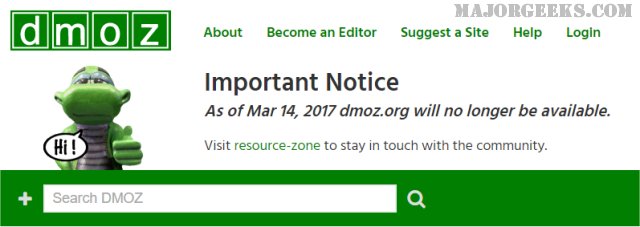DMOZ.Org to Permanently Close on March 14th
Posted by: Timothy Tibbetts on 03/02/2017 08:46 AM
[
 Comments
]
Comments
]
Old school geeks will most likely feel a little nostalgia to hear that DMOZ.org is closing. Anyone who was creating websites 20 years ago in Notepad remembers DMOZ.org as the place to submit your site and be found.

Today we have Google, Bing, and Yahoo (mostly Google) and once they know you're there, you spend hours and hours for the rest of your life trying to be found. DMOZ.org was a slow, cumbersome process but the upshot was you only had to submit once with the perfect meta tag information. Nowadays, sadly, it's all tricky, constantly changing SEO. If you didn't think the top SEO guys were earning their money, you'd be mistaken in today's era. They were so big at the time that it spun off competition sites including go.com and Zeal.
The site and community who maintain it are also known as the Open Directory Project (ODP). It is owned by AOL but constructed and managed by a community of volunteer editors. Sadly, this means it sometimes works as reliably and efficient as anything supported by volunteers. Examples were accusations of the "volunteers" giving favoritism to their websites, or sites they liked.
It was launched in 1998 and is currently owned by AOL, which most likely means it's just not generating revenue. There's a long, sorted history of DMOZ that you can read at Wikipedia.
A great example of their history started before Rich Skrenta (still remembered most for unleashing the Elk Cloner virus on the world) and Bob Truel (who worked at Sun Microsystems at the time) even started DMOZ. It started with the name. It was originally called Gnuhoo, but after a Slashdot article suggested that Gnuhoo had nothing in common with the spirit of free software, the Free Software Foundation objected to the use of the name "Gnu". So Gnuhoo was changed to NewHoo. Yahoo! then objected to the use of "Hoo" in the name, prompting them to switch the name again. ZURL was the likely next choice, but before the switch to ZURL, NewHoo was acquired by Netscape and became the Open Directory Project. Netscape released Open Directory data under the Open Directory License. Netscape was acquired by AOL shortly thereafter and DMOZ was one of the assets included in the acquisition.
Whew! If you've never heard of DMOZ.org, then don't let us stop you. Stop by before it's too late at https://www.dmoz.org/.

Today we have Google, Bing, and Yahoo (mostly Google) and once they know you're there, you spend hours and hours for the rest of your life trying to be found. DMOZ.org was a slow, cumbersome process but the upshot was you only had to submit once with the perfect meta tag information. Nowadays, sadly, it's all tricky, constantly changing SEO. If you didn't think the top SEO guys were earning their money, you'd be mistaken in today's era. They were so big at the time that it spun off competition sites including go.com and Zeal.
The site and community who maintain it are also known as the Open Directory Project (ODP). It is owned by AOL but constructed and managed by a community of volunteer editors. Sadly, this means it sometimes works as reliably and efficient as anything supported by volunteers. Examples were accusations of the "volunteers" giving favoritism to their websites, or sites they liked.
It was launched in 1998 and is currently owned by AOL, which most likely means it's just not generating revenue. There's a long, sorted history of DMOZ that you can read at Wikipedia.
A great example of their history started before Rich Skrenta (still remembered most for unleashing the Elk Cloner virus on the world) and Bob Truel (who worked at Sun Microsystems at the time) even started DMOZ. It started with the name. It was originally called Gnuhoo, but after a Slashdot article suggested that Gnuhoo had nothing in common with the spirit of free software, the Free Software Foundation objected to the use of the name "Gnu". So Gnuhoo was changed to NewHoo. Yahoo! then objected to the use of "Hoo" in the name, prompting them to switch the name again. ZURL was the likely next choice, but before the switch to ZURL, NewHoo was acquired by Netscape and became the Open Directory Project. Netscape released Open Directory data under the Open Directory License. Netscape was acquired by AOL shortly thereafter and DMOZ was one of the assets included in the acquisition.
Whew! If you've never heard of DMOZ.org, then don't let us stop you. Stop by before it's too late at https://www.dmoz.org/.
Comments






